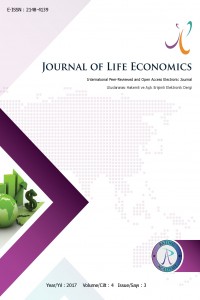THE SYSTEM OF THE PRESIDENCY OF THE COUNCIL OF THE EUROPEAN UNION AND ITS EFFECTS TO THE EU POLICIES
Abstract
The rotating presidency, which takes place every 6 months in the European Union, is a system in which the heads of states and governments can show themselves in the international arena. Member states which are holding the presidency work together closely in groups of three, called trios. The trio sets long-term goals and prepares a common agenda determining the major issues over an 18 month period. This system, which has existed since the beginning of the European Union, has been renovated and developed by processes of enlargement and deepening. In this study, especially after the entry into force of the Treaty of Lisbon, the politics of the countries that preside over the term will be analyzed. In this framework, it will be analyzed that whether the trio has a common policy or each president country tries to apply the country's own priorities. As a result, it will be attempted to understand the extent to which this system, which has a political prescription, contributes to policy-making in the European Union.
References
- “Amsterdam Antlaşması”, http://www.ab.gov.tr/files/pub/antlasmalar.pdf/ [Erişim Tarihi: 15 Mart 2017]. “Avrupa Birliği’ni Kuran Antlaşma”, İKV Yayınları, http://www.ikv.org.tr/images/files/A5-tr.pdf/ [Erişim Tarihi: 15 Mart 2017]. “Avrupa Ekonomik Topluluğunu Kuran Antlaşma”, İKV Yayınları,http://www.ikv.org.tr/images/files/A2-tr.pdf/ [Erişim Tarihi: 13 Mart 2017]. “Belgian Presidency”, http://www.eutrio.be/ [Erişim Tarihi: 12 Mayıs 2017]. “Council of Europe”, http://www.coe.int/en/web/portal/home/ [Erişim Tarihi: 14 Mart 2017]. “Cyprus Presidency”, www.cy2012.eu/en/ [Erişim Tarihi: 13 Mayıs 2017]. “EU Presidency”, http://ec.europa.eu/eurostat/web/ess/eu-presidency/ [Erişim Tarihi: 12 Mayıs 2017].
Abstract
Avrupa Birliği’nde, 6 ayda bir değişen rotasyon sistemiyle gerçekleşen dönem başkanlığı, ülke devlet ve hükümet başkanlarının kendilerini uluslararası alanda gösterebilecekleri bir sistemdir. Dönem başkanlığını yürüten üye ülke, trio olarak adlandırılan üçlü gruplar halinde bir arada çalışmaktadırlar. Trio, uzun vadeli hedefler belirlemekte ve 18 aylık bir süre boyunca ön planda olacak önemli konuları belirleyen ortak bir gündem hazırlamaktadır. Avrupa Birliği’nin başından beri var olan bu sistem, genişleme ve derinleşme süreçleriyle yenilenmiş ve daha verimli hale getirilmeye çalışılmıştır. Bu çalışma kapsamında, özellikle Lizbon Antlaşması’nın yürürlüğe girmesinden sonra dönem başkanlığı yapan ülkelerin politikaları analiz edilecektir. Bu çerçevede trionun ortak bir politika mı yürüttüğü yoksa her dönem başkanı ülkenin kendi önceliklerini mi uygulamaya çalıştığı araştırılacaktır. Sonuç olarak, politik öneme sahip olan bu sistemin, Avrupa Birliği’nde politika yapımına ne derece katkı sağladığı anlaşılmaya çalışılacaktır.
References
- “Amsterdam Antlaşması”, http://www.ab.gov.tr/files/pub/antlasmalar.pdf/ [Erişim Tarihi: 15 Mart 2017]. “Avrupa Birliği’ni Kuran Antlaşma”, İKV Yayınları, http://www.ikv.org.tr/images/files/A5-tr.pdf/ [Erişim Tarihi: 15 Mart 2017]. “Avrupa Ekonomik Topluluğunu Kuran Antlaşma”, İKV Yayınları,http://www.ikv.org.tr/images/files/A2-tr.pdf/ [Erişim Tarihi: 13 Mart 2017]. “Belgian Presidency”, http://www.eutrio.be/ [Erişim Tarihi: 12 Mayıs 2017]. “Council of Europe”, http://www.coe.int/en/web/portal/home/ [Erişim Tarihi: 14 Mart 2017]. “Cyprus Presidency”, www.cy2012.eu/en/ [Erişim Tarihi: 13 Mayıs 2017]. “EU Presidency”, http://ec.europa.eu/eurostat/web/ess/eu-presidency/ [Erişim Tarihi: 12 Mayıs 2017].
Details
| Primary Language | Turkish |
|---|---|
| Journal Section | Articles |
| Authors | |
| Publication Date | July 31, 2017 |
| Published in Issue | Year 2017 Volume: 4 Issue: 3 |


